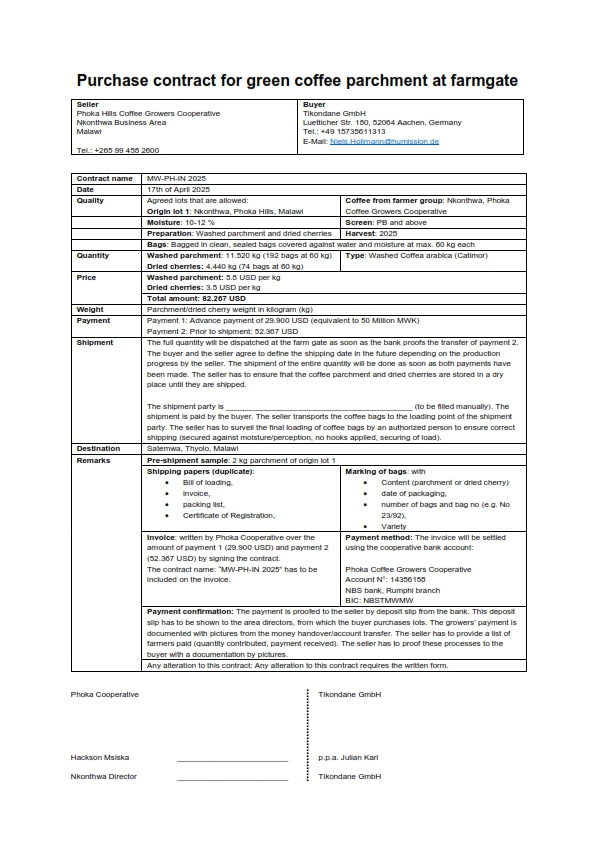100% transparency
Discover our transparency report
Here you will find all the information about our green coffee prices and other transparent key figures from our first financial year in 2023.
Where your coffee comes from
We take you on a journey to Nkonthwa, Phoka Hills
Where your coffee grows
Nkonthwa, the place where your coffee is grown, can only be reached via a small road and a very rickety wooden bridge. The village is located in northern Malawi on the eastern slopes of Nyika National Park. The farmers cultivate the fields around the washing station, where the coffee is centrally collected, weighed, and processed (in particular washed, hence the name washing station). The producers cultivate their fields, some of which are up to 60 minutes uphill, in mixed crops with apples, bananas, and tamarillos, and have an average of 5,000-7,000 coffee plants.
Who produces your coffee
The Phoka Hills Coffee Cooperative is located in northern Malawi on the eastern slopes of Nyika National Park. Four years ago, the cooperative broke away from the largest cooperative in the region and took the courageous step toward independence. The farmers were rightly convinced of the quality of their coffee and were no longer willing to accept the corruption, non-payment, and mismanagement in the large cooperative. So they joined forces with approximately 800 producers and founded the Phoka Hills Coffee Cooperative.
Nkonthwa is one of 13 business areas within the cooperative, which has a total of 800 members. Each business area has its own director, assistant, and accountant. All negotiations and price agreements in the business areas take place in full transparency in front of all farmers who wish to attend. In addition, the number of cherries contributed to the current harvest by each member is recorded with the utmost accuracy, ensuring that payments are transparent and fair. We were very impressed and convinced by the Phoka Hills Coffee Cooperative's ability to use its negative experiences from the past to build a democratic system that is fair for all involved. We also support the cooperative's high proportion of women, which is almost 50%.
A long-term partnership
Since the 2022 harvest, we have been sourcing 100% of our coffee from the Phoka Hills Coffee Cooperative. Our partnership with the farmers is based on the long-term development of coffee quality. That is why we invest in the dry processing of harvested coffee in order to generate even more value locally and offer you, the consumer, a new taste experience.

Full transparency of cost
We provide more than labels. We share a full break-down of our cost and the origin of your coffee. That's why you find our latest contract of the 2025 harvest on the left including the price for 1 kg of coffee parchment, which needs to be processed to obtain green coffee beans. The loss from parchment to roasted coffee is around 32% - and yes, green beans are actually green! This means that we pay 5.8 USD per kg of parchment to the farmers, while the amount increases to 7.44 USD per kg of roasted coffee.
Tranparency for coffee roasters
For coffee roasters and anyone who wants to know more, click on the button below to see our detailed price breakdown for green coffee from the 2023 harvest. The FOB price for green coffee from the 2023 harvest was EUR 6.50/kg, with EUR 5.61/kg going to the farmers in Nkonthwa.

